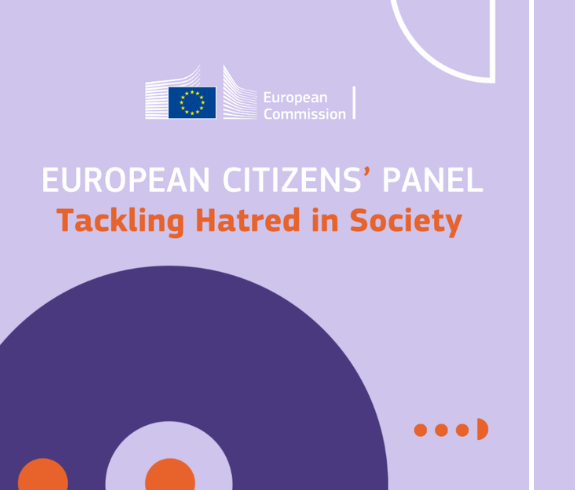European Citizens' Panel to discuss Tackling Hatred in Society

date: 26/04/2024
The European Citizens’ Panel on Tackling Hatred in Society will take place over three weekends between April and May 2024.
This European Citizens' Panel is a follow-up to the 2023 Communication “No place for hate: a Europe united against hatred” adopted in December 2023 by the European Commission and the High Representative for Foreign Affairs and Security Policy. The Communication calls for the creation of a pan-European space of dialogue, bringing together citizens from across the European Union.
The Citizens' Panel will identify possible policy actions, as well as all relevant players that should be involved at the various levels such as decision-makers, civil society, the private sector, and citizens. The Panel will ultimately result in a list of recommendations that will support the European Commission's future work on tackling both hate speech and hate crime. The recommendations will also aim to serve as a guide to help the European Union and its Member States to move from hatred and division to the shared enjoyment of European values, as enshrined in the Treaty of the European Union.
What are the European Citizens' Panels
European Citizens' Panels aim at better involving citizens in EU policymaking. They have been embedded as regular feature of democratic life in the EU following the Conference on the Future of Europe. European Citizens' Panels allow participants to work together both in groups and in plenaries, supported by a facilitation team, and a committee of experts who provide additional input. Participants in European Citizens' Panels are selected randomly. The process ensures that recruitment is representative of the EU's socio-demographic diversity, with requirements for a gender-balanced panel and a representation of young people aged 16-25 of a third of the panel. Other socio-demographic characteristics relate to education level, geographic location, and occupation.

The Commission's actions on tackling hatred in society
Over recent years, the Commission has worked on a set of laws and initiatives to promote and protect our common values and fundamental rights. The core piece of legislation is the 2008 Framework Decision on Combating Racism and Xenophobia, which ensures that serious manifestations of racism and xenophobia are punishable by effective, proportionate, and dissuasive criminal sanctions. In December 2021, the Commission proposed to extend the current list of ‘EU crimes' set out in the Treaties to hate speech and hate crime.
In December 2023, the Commission and the High Representative adopted a Communication on “No place for hate: a Europe united against hatred”. It is a call for action to all Europeans to stand up against hatred and speak up for tolerance and respect. The Communication on a Europe united against hatred is also a follow-up to the EU Anti-racism Action Plan 2020-2025, the Strategy on combating antisemitism and fostering Jewish life in the EU, as well as the Gender Equality Strategy 2020-2025, the LGBTIQ Equality Strategy 2020-2025, the Strategy for the rights of persons with disabilities 2021 – 2030, the EU Roma strategic framework for equality, inclusion and participation 2020-2030 and the Commission's work on anti-Muslim hatred. All these EU policy strategies are supported by the CERV programme.
Protecting Europe's democracies from the threats and harmful effects of disinformation and information manipulation and interference, including stemming from foreign actors, has become a strategic priority for the EU. Under the umbrella of the European Democracy Action Plan (EDAP), the Commission and the High Representative have developed a series of measures to tackle disinformation.
Through the enforcement of the Digital Services Act (DSA) and the reinforced code of conduct on countering illegal hate speech, further decisive steps will be taken to ensure that what is illegal offline is also treated as such online.
For more information:
